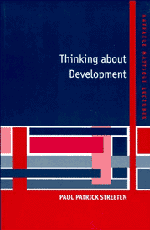Introduction
Published online by Cambridge University Press: 05 February 2015
Summary
My argument in these lectures has several strands. The principal focus is the eradication of poverty in the world. Some time is devoted to a discussion of the concept and measurement of poverty and hunger. I try to show that a liberal framework of prices and markets requires an active and efficient state, larger and more active than exists now in most developing countries. How is the agenda of this state determined? State action is needed in order to stimulate private action through complementary public services, or “crowding-in”. These services will go beyond the provision of a framework of law and order and security, to the conduct of economic policy, the construction of infrastructure, the financing of research, and institution-building. They will also comprise policies to make large, formal-sector firms symbiotic to small, informal-sector micro-enterprises through the “judo trick”. Above all, state action is needed to provide or finance social services – nutrition, education and health – for the poor, where private provision or finance are absent or inadequate. What is the optimal mix of private and public action, and how does it determine the division of the gains from growth between rich and poor?
It has been said that the state has become too big for the small things, and too small for the big things. Delegation downwards and organization of the poor is needed in order to mobize action against poverty.
- Type
- Chapter
- Information
- Thinking about Development , pp. 3 - 4Publisher: Cambridge University PressPrint publication year: 1995

